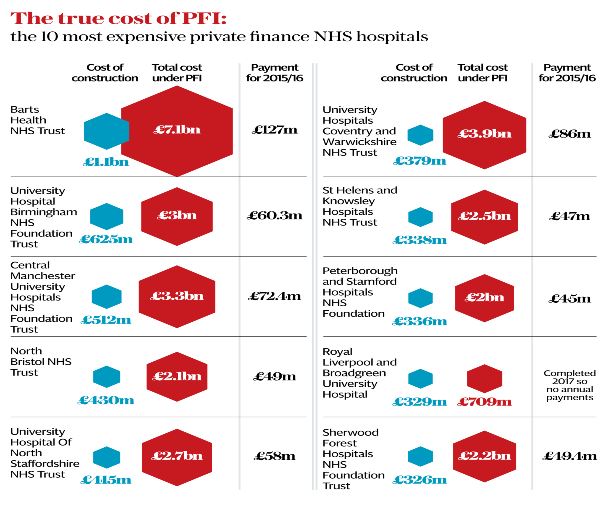The case against PFI grows stronger as the repayment costs rise, NHS finances deteriorate, and international interest rates fall. There is an alternative.

PFI is sometimes seen as yesterday’s battle. For over 20 years, capital funding for major public service schemes has been available predominantly only through PFI. Contracts have been tendered, partners selected, and the schools, hospitals, and prisons built. Even many on the left now view PFI as a given. Passim Allyson Pollock’s and John Lister’s excellent work on this subject, what is left to say?
The most recent data for NHS PFI schemes should remind us why PFI matters now more than ever.
The most recent figures reveal that the bill for private finance initiative hospitals reached £2bn in 2015/16. Moreover, tapering of the repayments, the lowering of repayments in the first years of a contract and raising them in subsequent years, and the indexation of payments linking them to inflation, mean that for hospitals with a PFI scheme the full revenue consequences will not be realised for years. Indeed, repayments are not projected to peak until 2028-29.
Figure One, below, illustrates the impact on individual Trusts.

Central Manchester NHS Trust paid £72.4m last year and Bart’s £127m for the pleasure of their new facilities. Bart’s currently runs a budget deficit of £134m. Central Manchester’s repayments are 10% of its annual clinical revenue. The sum of these ongoing revenue costs to the NHS is often dismissed given the scale of the current financial problems but they are a massive drain on the NHS. Significantly, these costs are greater than the government is promising to the NHS in future financial settlements. This funding could provide a vital lifeline for the NHS, preserving and protecting vital services whilst giving it the breathing space to transform and improve current services.
Unpersuaded? Then consider the value for money that PFI has delivered in the NHS. Government reports state that the capital value of the 105 NHS assets procured through PFI is some £11.8bn, for which the NHS will pay some £79bn over 31 years, (£4000 per household in the UK), of which £64bn is still outstanding. This is equivalent to a 30-year compound interest rate of 6.4%. Again, to illustrate, what this means to a Trust like Central Manchester is that it will eventually pay over £3.3bn for an asset that is currently worth only £512m. The rebuild of Bart’s is valued at £1.1bn but, under the terms of the PFI, the final bill to the Trust will be more than £7bn, with the Trust making payments until 2049 (Figure One).
The view I often hear is that there is no alternative to PFI. This was not true in 1992, when the policy was implemented, and is not true now. Interest rates, the price paid for a loan, are fundamentally a measure of risk: it is an economic reality that governments can always borrow more cheaply than private firms, even sovereign equity funds. The implied interest rate for government borrowing was around 3% in 2013/14 whereas PFI rates of return are over 6%. The decision not to fund hospitals through government borrowing was always a political, not an economic one. And if you still need convincing, since 2008 the world economic situation has changed drastically: when banks in other countries, such as Japan, will now pay you to take their money (through negative interest rates), it is fiscal madness not to take advantage of this.
There is a way out of PFI contracts. Contracts can be terminated and compensation paid. An example of this is Northumbria Healthcare NHS Foundation Trust which terminated its PFI deal, for which the Trust paid £24m in costs and a further £4m in compensation. Despite these costs, the foundation trust was still able to obtain savings of over £67m from ending the PFI contract early. The Scottish Parliament, it worth noting has already decided to dispense with PFI.
PFI is a triumph of dogma and ideology over reason; there is an alternative though – there always has been.
